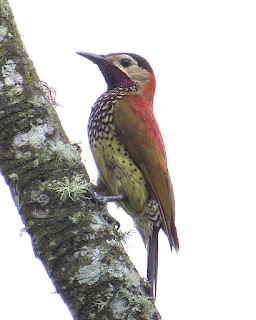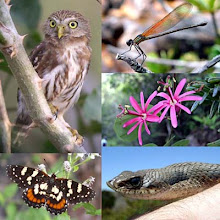September
23, 2015
The highway
from Cochabamba (in a semi-dry, temperate interior valley) to Villa Tunari (in
the tropical and wet Amazonian lowlands) drops through several life zones, and
we have time to visit only a couple spots today, as it is not so close to our
hotel. Weather is always an issue here too, as warm, most air rising from the
lowlands frequently creates fog and rain even in the absence of any sort of weather
system.
Indeed we
had fog at our first birding location, though we did get good looks at a
Rufous-bellied Bush-Tyrant and White-eared Solitaire after breakfast. We then
moved down to a seldom-traveled side road at lower elevation that has had some
great birds in the past. This is the San Miguelito subtation road, a narrow
track with lush vegetation along the the sides that I’ve been visiting since
2000. Instead we found a widened gravel road with recently cleared vegetation,
and further down the road noisy construction as the widening was in process. It
seems they are preparing to build a dam in the valley below, and this will be
one of their main access roads for equipment. It’s probably not going to be
such a great birding spot in the future, and so now options are even more limited
along the Chapare highway.
Still, we
saw some stuff, just not as much as
we has hoped. This roadkilled Chironius
sp. snake, for example, was a casualty of the increased traffic.
We did have
one good mixed flock, and this gorgeous Crimson-mantled Woodpecker performed
very nicely for us.
We spent
some time unsuccesfully trying to see the calling Yungas Manakins and to find a
Yungas Pygmy-Tyrant, but in the process we got great looks at the often furtive
Ochre-faced Tody-Flycatcher. At the same time we spotted this Lymanopoda acraeida, the Acraeine-mimic
Satyr.









No comments:
Post a Comment